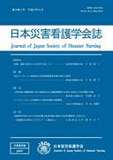Japanese
English
- 有料閲覧
- Abstract 文献概要
- 参考文献 Reference
要約
【目的】本研究は被災地でのボランティア活動について, 個人のレジリエンスの程度によって, 被災地で生じたストレスに対する不安の回復性や小集団活動への参加態度が異なるのかを明らかにすることを目的に, 大学生7名を対象に調査を行った。【方法】二次元レジリエンス要因尺度を用いて, レジリエンスの高い群と低い群に分け, ボランティアの活動前後の状態不安得点(STAI Y-1)を比較した。さらに, 小集団活動の参加態度の特徴を捉えた。【結果】STAI(Y-1)得点はレジリエンスの高い群が低い群と比較して, 活動後2・3ヵ月で有意に低くなっていた(p<.05)。また, レジリエンスの低い群は, 2回の小集団活動後の獲得要因における‘他者理解’得点が, 活動前と比較して有意に高くなっていた(p<.05)。一方, SYMLOGで評価した小集団活動参加態度は, レジリエンスによる特徴は認められなかった。【結論】レジリエンスの高い学生は, 被災地で受けた精神的ストレスフルな状況を時間経過とともに回復し, 精神的健康状態を良好に保つことができると考えられた。また, 小集団活動においては, レジリエンスの低い学生が友好的で同調性の高い小集団の影響を受けやすいことが示唆された。
This study focused on seven (7) university students engaged in volunteer activities in the disaster area to reveal the recovery process for stress perception created in the disaster area and whether there were any differences in attitude to participate in small group activities based on the degree of individual resilience. First, a twodimensional resilience factor scale was used to divide them into a high and low resilience group, then the State Anxiety Index (STAI-Y-1) was compared to before and after the volunteer activities. The comparison of the high resilience and low resilience group for STAI (Y-1) showed a significant drop two to three months after activities (P<.05). The low resilience group has significantly higher scores for “understanding others” in the gain factors after two (2) small group activities compared to before activities (P<.05). Meanwhile, the small group activity participation attitude evaluated using SYMLOG showed no difference according to resilience. Students with high resilience, based on the above, recovered from the full mental stress state received at the disaster area as time elapsed, and are able to maintain a strong mental health condition. In addition, we thought that the low resilience group is affected in small group activities.
Copyright © 2015, Japan Society of Disaster Nursing All rights reserved.


